-
 2022. November VOL. 656
2022. November VOL. 656
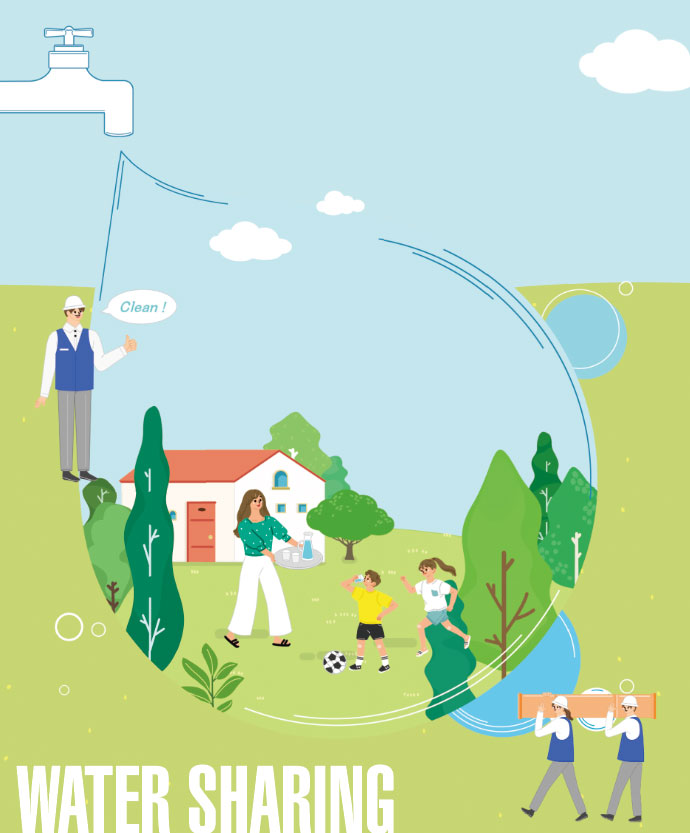
K-water is committed to supplying clean and safe water that people can trust and drink by managing tap water according to the global standards, and ensures the safe and efficient water supply in S. Korea by actively using ICT.
K-water has been leading the advancement of the national water supply to provide clean and safe potable water since it became the sole manager of water consumption and supply(water supply) in June 2019.
Notably, the world’s first ‘AI-based smart water purification plant’(hereinafter ‘AI purification plant’) that capitalizes on big data and AI technology attests to K-water’s superior water management ability. AI water purification plant is an intelligent water purification plant with enhanced stability in the operation of the plant by enabling the self-operation of the plant and optimized energy management with big data and AI technology. In April, the effectiveness of the AI-based smart water purification plant was validated through a pilot project implemented on Hwaseong Water Purification Plant.
Based on the outcomes, K-water plans to expand the application of the new AI-based water purification system to 43 metropolitan water purification plants nationwide by next year. With the rollout of the AI water purification plant, K-water has laid a foundation for stable water supply and saved the water supply operation cost by approximately 4%. In addition, it is also planning to establish a standard model for the AI water purification plant and acquire intellectual property rights on it to share the technology with water-related corporations.
K-water has also built a digital twin water purification plant linked to the AI-based plant, which enables it to manage water in a way that makes forecasting possible. The same conditions of realistic scenarios can be created on a computer with different scenarios being simulated. Likewise, the digital twin system can help prevent accidents and conduct mock training exercises in virtual and augmented reality by creating 3D images and integrating different systems.
K-water plans to verify the effects of the pilot project for the digital twin water purification plant by next year. K-water provide world-leading tap water as a result of digital transformation and innovation throughout the entire tap water supply system.
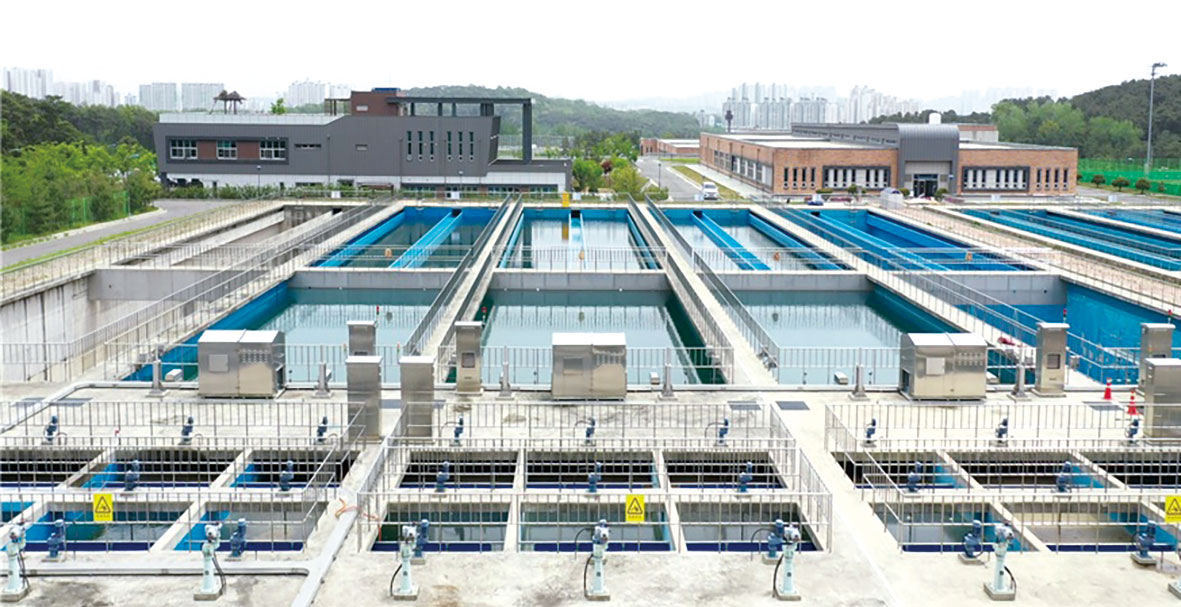 AI-based smart water purification plant, a pilot project under way at Hwaseong Water Purification Plant
AI-based smart water purification plant, a pilot project under way at Hwaseong Water Purification Plant
K-water excels in responding to tap water crises, operating and managing river basin water support centers across the country under the purview of the Ministry of Environment. K-water offers customized technical support, such as helping with field responses and facility diagnosis in actively handling potential accidents involving local water supply, enhancing the water flow rate, supporting water quality control, and providing water welfare services.
As the amount of tap water consumption and water leakage rose steeply in January last year due to the cold wave that affected the whole country, 25 cities and counties experienced water shortage and disruptions to tap water supply.
Four of our river basin water support centers formed a field investigation team to conduct 907 cases of leakage checks and restoration work in households to reduce leakages and help detect them, thus restoring water supply back to normal ahead of schedule. In addition, K-water dispatched 378 water supply trucks and donated 37,900 bottles of water to communities experiencing water supply disruptions as part of its water welfare services to the public.
K-water also developed a freeze and burst risk information service which is available to all citizens in a bid to meet the target of zero accidents in winter.
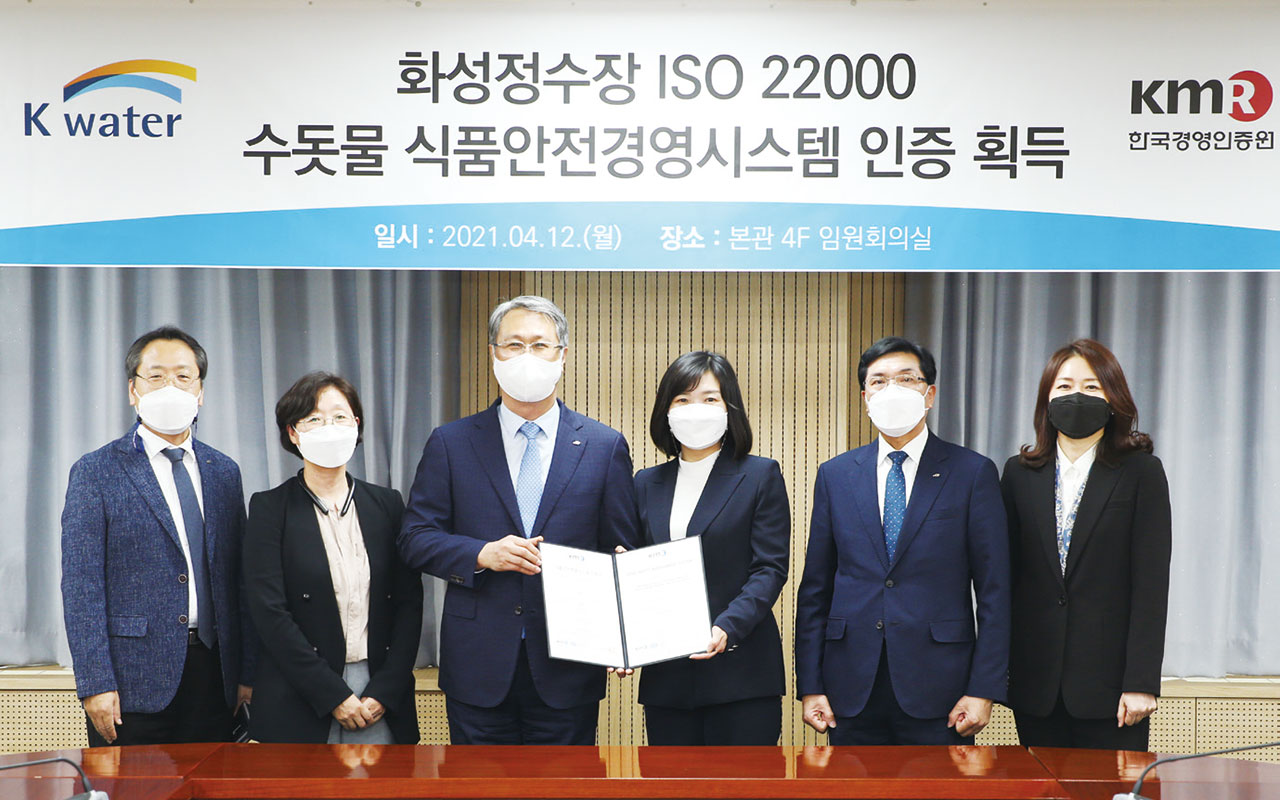 ISO 22000 certificate for food safety management system for tap water
ISO 22000 certificate for food safety management system for tap water
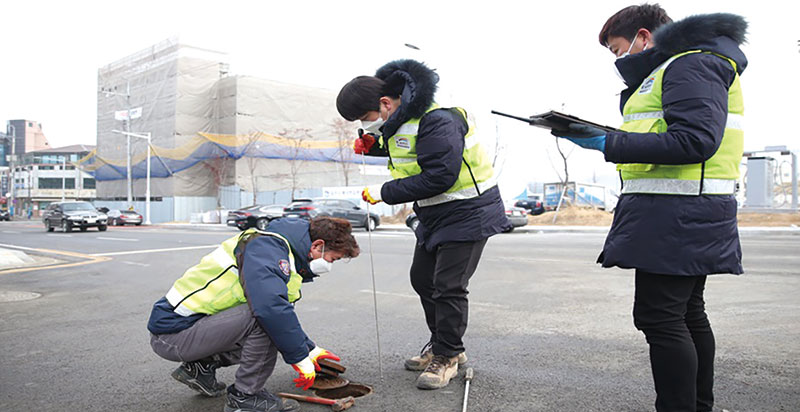 Support for coping with freeze and burst by a river basin water support center
Support for coping with freeze and burst by a river basin water support center 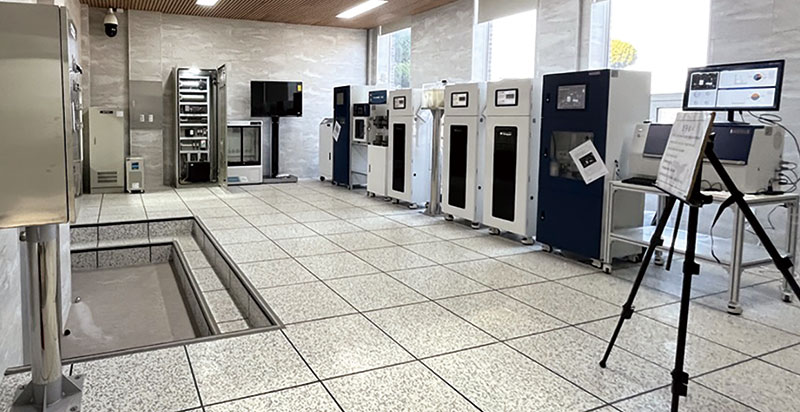 ‘Water Quality Measurement Center at the Chilbo Water Intake Station linked to the water quality monitoring system
‘Water Quality Measurement Center at the Chilbo Water Intake Station linked to the water quality monitoring system
K-water is currently implementing the systemization-geared project to monitor water quality at water sources in a more systematic way. A system to monitor water quality at 31 water intake stations equipped with municipal water supply systems launched last year to improve water quality prediction and monitoring. Water quality management including early detection of water quality problems and big data statistics-based prediction has been incorporated into the smart system and the collected water quality data will be provided through the National Water Information Center to local government offices that use raw water of a municipal water supply system.
The number of items subject to monitoring for water intake stations has been increased to make real-time monitoring possible and data prediction accuracy is being improved by capitalizing on cutting-edge water quality prediction technology.
The ‘AI-based Daecheong Dam Water System Water Quality Prediction Service Development Project’ was selected as the finalist in the publicly open ‘2022 Digital Public Service Innovation Project Contest’ hosted by the Ministry of Science & ICT on April 27. With climate change making it increasingly difficult to predict the patterns of water quality abnormalities, the system aims to collect and analyze water quality data of the Daecheong Dam water system and make predictions in real time using new technologies including AI, thus overcoming the limits of the existing water quality monitoring system of water intake stations, while also responding to water quality issues in a timely manner. The system is scheduled for completion in the second half of the year, and once developed, it will be disclosed to the public on ‘wateRound’, a cloud-based digital water platform launched by K-water.
The water quality prediction system based on AI and other digital technologies is expected to contribute to supplying safe tap water and keeping potable water sources clean and safe.
K-water is currently working on the construction of a regional water supply smart management system to monitor the entire tap water supply process using IoT services in real time, respond to accidents promptly, and prevent secondary accidents. The Ministry of Environment has established a framework plan to create a smart regional water supply management system for 161 municipalities, and plans to build the infrastructure by 2023. K-water is creating the smart system for 76 municipalities under the purview of the Ministry of Environment.
Concurrently, it is also building a smart pipe network management system for 48 municipal water supply facilities in the country. The goal of the project is to build a clean and safe tap water supply system by managing the amount and quality of water in real time throughout the entire process of tap water production and the supply thereof including water intake stations, water purification stations, and water distribution pipes using ICT and other technologies. Last year, K-water built a smart pipe network management infrastructure for 9 facilities(23 in total), and plans to complete the construction of the infrastructure for 48 municipal facilities by next year.
In addition, it has worked with the National Police Agency to complete the creation of a pipe network video monitoring system, which allows it to proactively respond to pipe-related accidents.
Rather than resting on its laurels, K-water developed the app ‘WaterNow’ to provide real-time water supply information to citizens through mobile phones, and continues to make every effort to supply the world-leading clean tap water services.
K-water CEO Jae-hyeon Park said, “K-water is concentrating all its efforts on providing safe and clean tap water from the water intake station to the tap. K-water is pursuing innovation by instituting digital transformation throughout the entire tap water production process and providing proactive administrative services.”

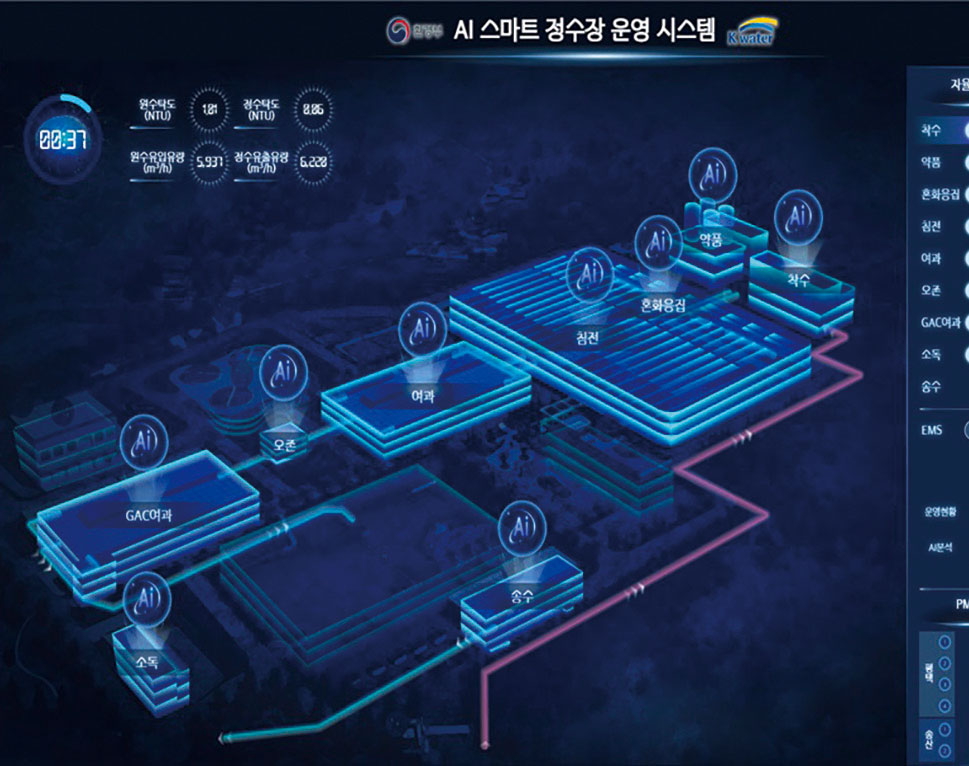 Demonstration of smart water purification system operations
Demonstration of smart water purification system operations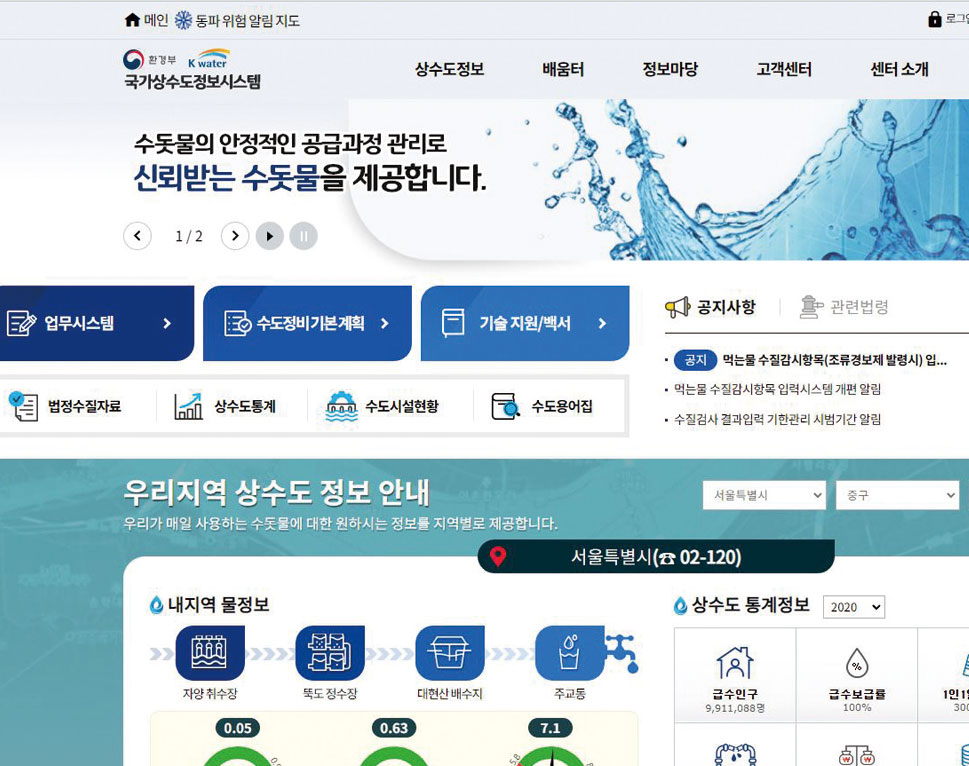 National Water Information Center(www.waternow.go.kr)
National Water Information Center(www.waternow.go.kr)